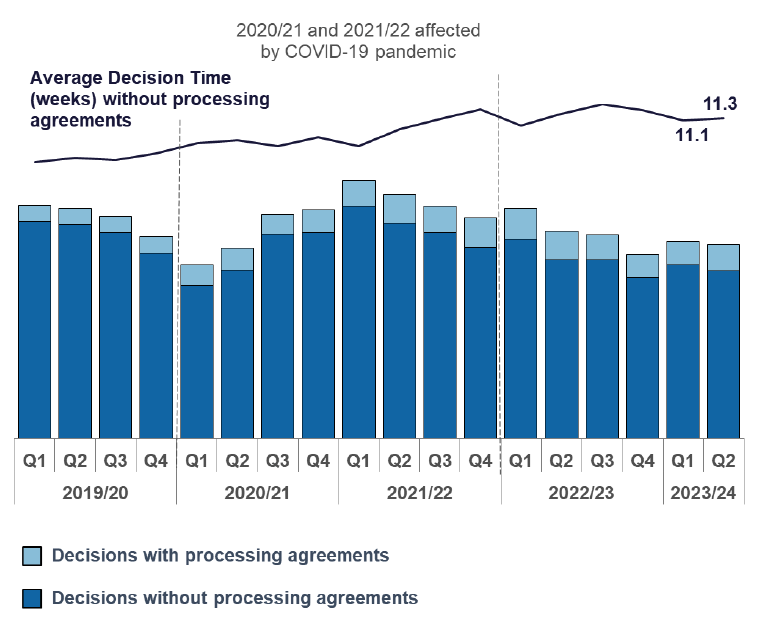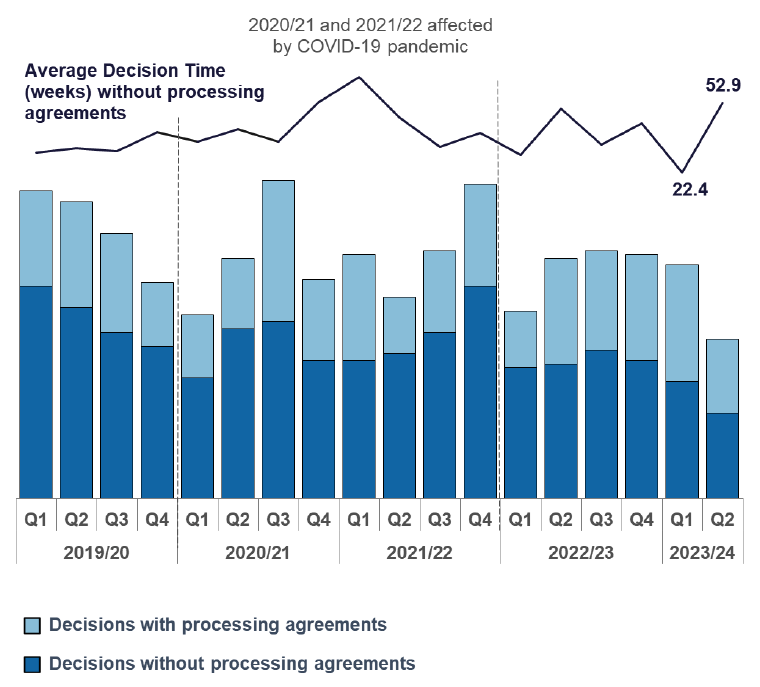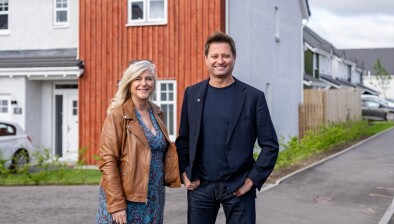Homes for Scotland hits out at ‘woeful’ planning statistics
Jane Wood
Homes for Scotland (HFS) has called for critical government action after new planning statistics revealed that the average processing times for major housing developments are now taking over a year.
Described as “woeful” and “unacceptable” by the sector body, the figures highlight a 41% drop in the volume of applications for major housing developments (those for 50 or more homes) in the first two quarters of 2023/24 compared to the same period a year prior. This continues the decline in such applications coming forward for the fourth consecutive quarter. Despite a continuing fall in applications, the average processing time for Q1 and Q2 2023/24 was 62.1 weeks (a rise from 36.4 weeks on Q1 and Q2 2022/23) against a statutory timeframe of 16 weeks.
The number of local housing development applications has also fallen by 18% across the same period, with average processing times for these being 17.8 weeks (more than double the eight-week statutory timeframe).
HFS chief executive Jane Wood said the call for critical action comes against a backdrop of local authority housing emergencies and research showing 693,000 Scottish households in some form of housing need.
Ms Wood said: “With the National Planning Improvement Champion yesterday concluding that there is no overall agreement on what successful planning looks like, I’m certain that
we can all be united in the view that these woeful figures aren’t it and are simply unacceptable.

Figures for all local developments
“The Scottish Government must get Scotland’s planning system sorted if we are to ensure this and future generations are able to access warm sustainable homes that meet their needs and they can afford.
“These figures highlight the scale of investment in planning services that is required at a time when the Scottish Government has announced a 43% reduction in the planning budget from £11.7m to £6.6m.
“They also show the critical need for immediate short-term solutions. We have already submitted the urgent actions we believe need to be taken by the Scottish Government and want to work with Ministers and officials to implement meaningful change as quickly as possible so that Scotland’s people have the range and choice of homes that they both need and deserve.”
More than 11,700 local development applications were decided in the first two quarters of 2023/24. This was 11% lower than the same period in 2022/23. The long-term trend is downward. The average decision time remains higher than before the pandemic at 11.1 weeks in Q1 and 11.3 weeks in Q2.

Figures for all major developments
In Q1 there were 706 local development applications with processing agreements, and almost three-quarters 72% met agreed timescales that had been set between developers and local authorities. In Q2 there were 783 with 70% meeting the agreed timescales.
There were over 1,400 local housing developments not subject to processing agreements decided during the first two quarters of 2023/24. This was 18% lower than the same period in the previous year. Average decision times continued to be higher than before the pandemic (17.6 weeks in Q1 and 17.0 weeks in Q2). Around 40% of decisions were made in less than two months. Where processing agreements were in place, almost two-thirds met agreed timescales.
The number of decisions on major developments in the first two quarters of 2023/24 was 111 (there were 121 in the same period in the previous year). The average decision times for applications without processing agreements were 22.4 weeks in Q1 and 52.9 weeks in Q2.
There were 19 major housing developments not subject to processing agreements decided during the first two quarters of 2023/24. The average decision times were 24.4 weeks in Q1 and 99.8 weeks in Q2. (Average times for these applications can be skewed by one or two particularly large values). There were 22 applications with processing agreements. Timescales were met for 64% in Q1 and 38% in Q2.
















